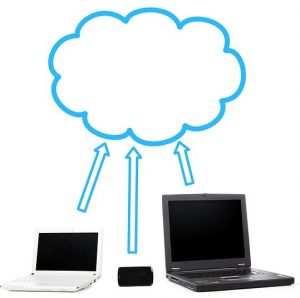Business productivity relies on shared resources. Cloud computing delivers shared data to employees and customers all in one place. The infrastructure has a low failure rate, secure database and is affordable.
Too good to be true? Cloud computing is not a hoax!
Over the past 10 years, traditional in house software has shifted toward the internet. Cloud computing stores and accesses your information over the internet instead of your computer’s hard drive. When you store information on a hard drive, the data is only available on one computer, which is referred to as local data. Information stored over the internet is available to multiple users in any location. Cloud computing can communicate easier for companies with large amounts of information. Three cloud models were developed for various business styles.
Cloud Computing Infrastructure
The private cloud is only accessible through a single organization. The information can only be accessed through a specific client in a virtualized environment. Because of the specific resources, private cloud does not require the internet, which makes the private cloud the most secure cloud model. The single-tenant software dedicates the hardware, storage and network to the entire company.
Public clouds use physical resources to make information accessible over a public network such as the internet. The multi-tenant service is shared with a number of clients and employees. Users can’t customize the software or select the hardware. The public information is shared over the internet where the provider has delivered the information. Multiple users are able to use the same shared infrastructure.
The Hybrid cloud model is a combination of private and public cloud models. Heavy projects can be distributed through in-house and external resources. The Hybrid cloud is more affordable because the model scales the costs toward the company’s needs. Unfortunately, hybrid’s cloud has led to security concerns. Cloud developers supported the infrastructure with passwords to carry out all critical operations.
Many businesses use hybrid cloud to share information with employees and customers. You are able to connect sales, services and marketing, without developing a confusing application. I am sure that you already have enough to do. Take a breather with cloud computing!
Why Cloud Computing is Helpful for Businesses
- Reduced costs
Servers can be costly. Cloud computing decreases the number of servers which lowers operating expenses. Your company can lose a great deal of costs by freeing your space in data centers.
- Agility
All companies are seeking ways to increase responsiveness to their customers. Cloud computing can simplify your systems so you can take more time to improve your processes. Cloud computing decreases administrative tasks, maintenance and IT to facilitate projects.
- Big data
Many companies process large amounts of data that can be difficult to manage. Multiple employees sift through the unstructured data every day. Cloud computing develops collaboration that can move your business forward.
- Superior safety and security
Many business owners are concerned over cloud’s security premise. Cloud performs many tasks that are highly scalable; therefore cloud has developed software that instantly detects irregular activities. You choose who has access to what operating system.
- Easier management
A digital panel reveals the clouds infrastructure exposing problems. If you have an issue within users, your information can be found instantly, rather than seeking though confusing files.
Many of you have been on hard drive since day one of cutting the red ribbon to your business’ doors. It is natural to hesitate to insert your information online. Cloud computing can improve communication and increase productivity. By eliminating the problems of customizing and frequent upgrades, you have time to focus on increasing your KPI.
